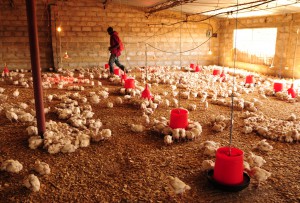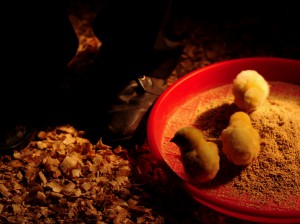Quiet Revolutions
Wednesday, July 11th, 2012
Though it’s only the beginning of the third day that Rich and I are in Zambia, it feels like it’s been much longer. Maybe because of all the long meetings we’ve had thus far and how much work there is still to do. For me part of the anticipated sensory overload has to do with having the chance to see, touch, and really understand everything that, before this trip, was just a series of single line items in documents and financial statements sent from over 10,000 miles away and discussed on conference calls for the past four months. Meeting Charles, the Executive Director of Hope Ministries, his wife Margaret, and the new poultry staff has been great, and touring the farm property –a business that just completed its first year of operations and has learned many lessons along the way- made the sense of urgency and everyone’s hopes and expectations of the farm’s success come alive.
The following stream of consciousness stems from our meetings and conversations in the last few days. The process of getting things accomplished in developing countries is not exactly linear, nor does it follow the structure or schedules that are common in the U.S.
…Once the electric fence is installed on the last side of the property there will be a formal division of land from the neighbor next door, who initially sold the land to Hope… while Hope officially owns the farm property, they are still waiting for the surveyors to provide the blue print of the property so the title can be applied for… it can take “two days, three weeks, three months, or three years to get the title!”… but with some legal pressure hopefully sooner… Next item: Once the title is ready, the farm can apply for its own source of energy, currently pulled from a neighboring property for a fair fee … once the Hope farm has its own energy source this will by no means signify that power will be available consistently….the frequent power outages cause a heavy reliance on charcoal to keep the baby chicks alive and warm.. . what would really be best would be a series of solar panels, estimated at USD $8,000… Next item: keep in mind that no electricity also means no water as the electric pump from the water well won’t work… and the chicks consume substantial amounts of water…and the energy and water issues only compound as we expand the first poultry house to capacity, 16,000 chicks per cycle…Next item: needing to blast through unexpectedly large rocks in the ground that are blocking access to creating the necessary sewage infrastructure for bathrooms… Next item: investing in the right personnel and retaining them, one of the most challenging things the farm has faced thus far…Next item: maximizing profits with the small margins afforded by chicken sales requires scaling the operation…..scaling the operation will require additional injections of capital…
The line items of short and long term needs and challenges go on and on. Yet despite the stress of running a young new business in the capital city of Lusaka, Zambia, morale is high as we talk about new markets and possible distribution strategies, the recent discovery that chicken manure is in demand and can be sold, consequently offsetting the cost of wood shavings and decreasing operational expenses, and so on. I ask Charles about blueprints for the farm, quality of land that is not being currently used, and whether there is a way to create a map of the new markets and their relative distance to the main and only market the farm sells at now. Would the Lusaka congestion be a barrier to entry? How will the one and only truck Hope owns and uses for chicken sales perform if it is used around the clock? And then there is the question about night and day sales, and how they differ. So much to think about.
At the end of the day, all of these discussions, challenges, and opportunities hinge on something very powerful- the reason why the farm was created and why Spark Ventures invested in it in the first place. That reason being to fund the programs that feed, educate, and support the 300 students and growing number of alumni from Hope Community School, most of them orphaned and counting on Hope Ministries to help them achieve their potential and live a meaningful productive life. These programs are almost entirely funded by Spark now, but both sides of the Spark-Hope partnership look forward to a future where Hope will be operating through funds generated by the poultry farm.
Eventual self-sufficiency and economic independence for an operation the size of Hope will be what I would consider a quiet revolution. It may not make international news but the impacts will cause ripples in society, encourage replication, and increase confidence in a partnership model that works to counter global challenges such as unequal access to resources, underdeveloped infrastructure, inefficient governments, and dependence on foreign aid, while encouraging the growth of social sectors in developing countries through individual and corporate philanthropy and social enterprise. Functional institutions like government have a clear place in the evolution of societies, but Spark’s model is interesting in that it has the potential to use a venture philanthropy approach and leverage market forces to overcome traditional barriers to international development.
I will pause here as Rich, Charles and I are getting close to Ndola. The scenery has gotten greener yet a city landscape is slowly emerging. Passing through the city, we’ll soon arrive at Hope Ministries, where the Hope primary school teachers are waiting for the teacher survey we’ll be administering. My jet lag is still lingering a little but I’m happy and excited. Until next time.
Lucy






